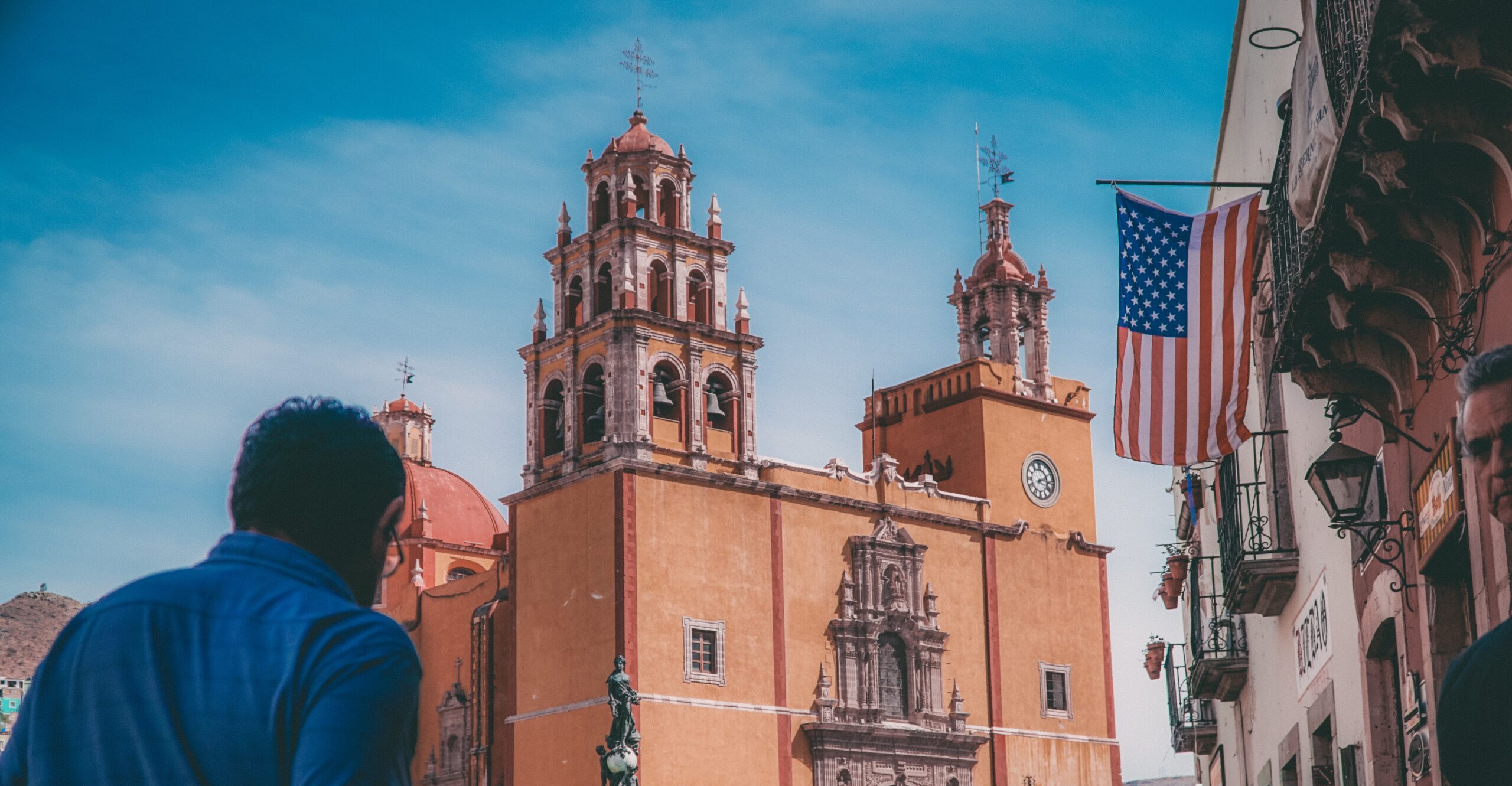Several months ago, a friend shared with me that she referenced my “church friends,” and her boyfriend said, “Sarah, church?” Her boyfriend and I had previously shared conversations about our experiences with non-monogamy, and I might have slept with his cousin once (…I did). “Woman of God” was perhaps not what came to mind for him when he thought of my open sexuality.
If you look at my Instagram profile today, you will see the words “Christian,” “queer,” and “slut” side by side (with a few others in between). And I’m sure my friend’s boyfriend was not the first person to be surprised at this combination of things.
I am not alone in living at this intersection. I had a conversation with a friend who has a strong faith and is making decisions for her career future, in which she said “I don’t know if I’m try’n to be a lawyer or a stripper,” and I responded, “girl, I feel that.” We are multifaceted people.
There are social media profiles like @beloved_arise and @adameli that openly share stories of queer religious folk. Nevertheless, we are certainly still a minority of a minority. People may side-eye us like we’re doing something wrong, because something in their brain is not clicking…and it’s not totally their fault. We live in a culture that places faith and sexual liberation in opposition, when in fact, they can coexist beautifully together.
The Mainstream Narrative
Many religious people have negated any and all productive messages about sex, and as a result, many sex educators hear religion and think throw the whole thing out.
Hosts of the podcast Girls Gotta Eat, Ashley Hesseltine and Rayna Greenberg, talk candidly about many facets of sex unapologetically. Their episode with comedian Usama Siddiquee is called “From Devout to DTF,” and discusses his experience being raised in Muslim purity culture. They bring attention to the important issue of children growing up with misinformation and shame around sex. The solution, it seems, is the hell with religion altogether.
Many people were raised in a conservative religious community or at a house of worship where they were scarred by experiences of blatant sex-negativity, sexism, homophobia, and transphobia. I will never forget a video we watched in one of my sex education classes where a Christian leader standing before a group of teenagers described women’s sexuality as tape, getting less sticky – less utile and desirable – the more things it is stuck on – the more sexual partners she has. Religious trauma is real and should not be underestimated.
Some folks were spared this fate because they were raised without religion at all, but they heard enough bad things about religion from others that they believed the whole thing was, indeed, trash. Many have found ways to connect spiritually without organized religion, in a way that is conducive to their sexuality.
In The New Bottoming Book (which they reference in my favorite The Ethical Slut), the two authors Dossie Easton and Janet Hardy write: “When you bring spiritual awareness to your sexual practice, you can become directly conscious of–connected to–that divinity that always flows through you….For us, sex is already an opportunity to see God.”
For me personally, taking up yoga in recent years and taking classes on topics like tantra have expanded my view of the mind, body, and spirit connection. I find it beautiful how we call God by many different names – creator, divine, mother, nature, universe….
AND, I think you should be able to keep calling on Allah or Jesus Christ if you want to while expressing yourself sexually how you see fit.
Shitty Church History
As a Christian myself, I wondered where sex-negativity in Christianity came from. In Dan Brown’s historically-based novel The DaVinci Code, characters Leigh Teabing and Robert Langdon converse about the start of the first church following the death of Jesus:
“Constantine turned Jesus into a deity who existed beyond the scope of the human world, an entity whose power was unchallengeable…now the followers of Christ were able to redeem themselves only via the established sacred channel–the Roman Catholic Church.”
“For the early Church,” Langdon explained in a soft voice, “mankind’s use of sex to commune directly with God posed a serious threat to the Catholic power base. It left the Church out of the loop, undermining their self-proclaimed status as the sole conduit to God. For obvious reasons, they worked hard to demonize sex and recast it as a disgusting and sinful act. Other major religions did the same.”
Prior to Constantine’s power-hungry manipulation, most people in ancient Rome had a relationship between their sexuality and their spirituality. In the below clip from the movie adaptation of the book (at 2:24 to 3:15), Langdon and Teabing explain how leaders at the time were threatened by “free-thinking women” and silenced sexual and feminist narratives that got in the way of them ruling the world.
So, all this is to say, the first major church, the Roman Catholic Church, has kind of always sucked. At the beginning, its leaders were not motivated by living in alignment with the teachings of Jesus Christ, but by keeping emperors rich and happy.
Centuries after the fall of Rome, figures like Martin Luther and John Calvin questioned Catholic norms like offering salvation in exchange for money, and they split off into the Protestant church. A few more centuries after that, Protestantism has split into so many sects that it includes everything from conservative Bible Belt denominations to my own United Church of Christ (UCC).
My Church
Many people who grow up in a conservative church, whether Protestant or Catholic, don’t know their other options, or are afraid to step out and try the unfamiliar. Yes, the Catholics are still around, not allowing women or gender-expansive people to hold positions of power, trying to fit ancient rules to modern life and creating an image of hypocrisy for Christians everywhere. I think Pope Francis secretly knows what’s up, but progress is sloooow over there. I am lucky that my former-Irish-Catholic mother and Italian-Catholic father decided that black-and-white stances on divorce (People can’t leave their abusers?) and general “Catholic guilt” were enough to push them out of their comfort zones and into finding a different kind of church.
The history of the United Church of Christ includes some great moments, like being the first Christian denomination to ordain a woman in 1853 and to ordain an openly gay person in 19721. It also includes questionable things like being built in a racist system, as many of our churches started as town meeting houses in colonial America.
I am glad to see that the UCC is always working for progress and justice. Since 1985, they have encouraged congregations to go through a process to become “Open and Affirming,”2 a designation which means they are explicitly inclusive of LGBTQ+ individuals in all aspects of church life. I have seen individual churches that have struggled with these ideas, and I have chosen to be a part of a church that does this beautifully.
My church now attracted me with rainbow doors outside. They sponsored a group including myself on an intensive racial justice training, and the first thing one of my pastors did was 👏 throw 👏 out 👏 all 👏 the 👏 images 👏 of 👏 white 👏 Jesus 👏. (That’s right, Jesus lived in the modern-day “Middle East.”) The same pastor preached a sermon a few months back about the importance of being called by your name of choice, highlighting the experiences of transgender people. (I highly recommend a listen here at 35:17 to 46:36, or starting at 24:50 for the full sermon intro.) In everything we do, we strive to focus on the origins of our faith – not Constantine, but Jesus – and his “greatest commandment,” to love one another.
A belief in this call and a faith community are things that many people are not interested in giving up, even as they embark on a journey to living their best sexual lives. Erica Smith says about her program Purity Culture DropoutTM, in which participants can rewrite their sexual values, “Not everyone renounces religion when they renounce purity culture.” So how exactly can our views about sex align with our views about God?
My Beliefs
My view on the topic can basically be summed up as follows: God created a human experience with sexual variety on purpose, and God wants us to live authentically to ourselves and in support of one another.
If you are a Torah or Old Testament believer, then you likely subscribe to the idea that we as humans are created “in God’s image.” Complete with vulvas and penises and vaginas and scrotums and nipples and prostates….
In The Ethical Slut, Easton & Hardy share: “We prefer the beliefs of a woman we met, a devoted churchgoer in a fundamentalist faith. She told us that when she was about five years old, she discovered the joys of masturbation in the back seat of the family car, tucked under a warm blanket on a long trip. It felt so wonderful that she concluded that the existence of her clitoris was proof positive that God loved her.”
God gave us this wild human experience with physical pleasure as a part of it (and even God experienced it, through Jesus Christ, if you’re a New Testament believer). Below is one of my favorite quotes:

So no, I don’t believe in a god who created the universe and is mad about my dildos.
I worship a god who did all that and thinks my dildos are great. So long as they are a positive force in the world.
Therapist and content-creator Dr. Sprankle shared another tweet in which he pointed out that “Masturbation, porn, and sex work can be engaged in healthily.” And of course, some sex-negativity-indoctrinated folks came to the rescue (sarcasm) in the Instagram comments, pointing out ways they’d perceived masturbation, porn, and sex work to go wrong. In response, I chimed in: “Key words ‘can be.’ Doesn’t mean ‘always is.’ There are definitely cases where porn isn’t engaged with healthily. There are also cases where alcohol or gambling are engaged with unhealthily, and then there are people who know the line between a good time and harmful behavior.”
Another Instagram user with handle @h.alice.m added on: “hell there’s even times when what we deem as inherently healthy activities can be engaged in unhealthily! Exercise, eating avocados, etc etc.”
To quote The Ethical Slut again: “There is nothing in the world so terrific that it can’t be abused if you’re determined to do so: familial connections can be violated, sexual desire can be manipulated. Even chocolate can be abused. Abuse doesn’t change the basic wonderfulness of any of these things: the danger lies in the motivation of the abuser, not the nature of the item.”
I even heard a sermon about this topic once when I was younger. The preacher talked about how money is not bad, greed is; substances are not inherently bad, but substance abuse can be a problem; etc. And my horny mind extrapolated what was not said: sex is not bad unless it is used for bad.
If you’d rather stay away from money, substances, masturbation, porn, sex work, gambling, avocados, or chocolate altogether, that’s your prerogative. It is not my own choice to do so, and it is not one that I believe my faith prescribes. So long as I am taking care of my neighbor and myself in the process, I can kink it up to my heart’s desire.
More Work To Do
Although I have never attended a church that has told me not to use birth control, I have also never been to a church that has explicitly told me the above. I’ve had to interpret my faith to figure that out on my own.
I recently got drinks with our head pastor (yes, that’s a thing), and I shared with her (yes, her) about my identity as non-monogamous, including that for me, a lot of it “is about sex.” She did not chastise me or even look at me funny. She acknowledged how difficult it must be for me to find my most natural existence as one that goes against the grain. She encouraged me to keep down my own path, as the alternative “is like death, is like feeling not alive.” And don’t I know it.
The feeling of “other” I sometimes experience is analogous to that of groups that we clearly welcome into our church family. If you are gay or trans or Black or an immigrant or need an ASL interpreter to worship with us, you are welcome. As is said in our sanctuary every Sunday, “no matter who you are or where you are on life’s journey, you are welcome here.” I look forward to the day when we can be unafraid to say that yes, we really mean sluts included. Dominatrixes, polyamorous triads, and teenagers making their sexual debuts are all integral parts of “the glory of God’s creation.” In a society where our media tells us that churches are anti-sex, how powerful it would be to stake a claim that we are not.
Faith does not preclude sexual freedom, and sexual freedom does not preclude faith. I hope that those of us who value both can know this and can live our lives feeling fully aligned.


